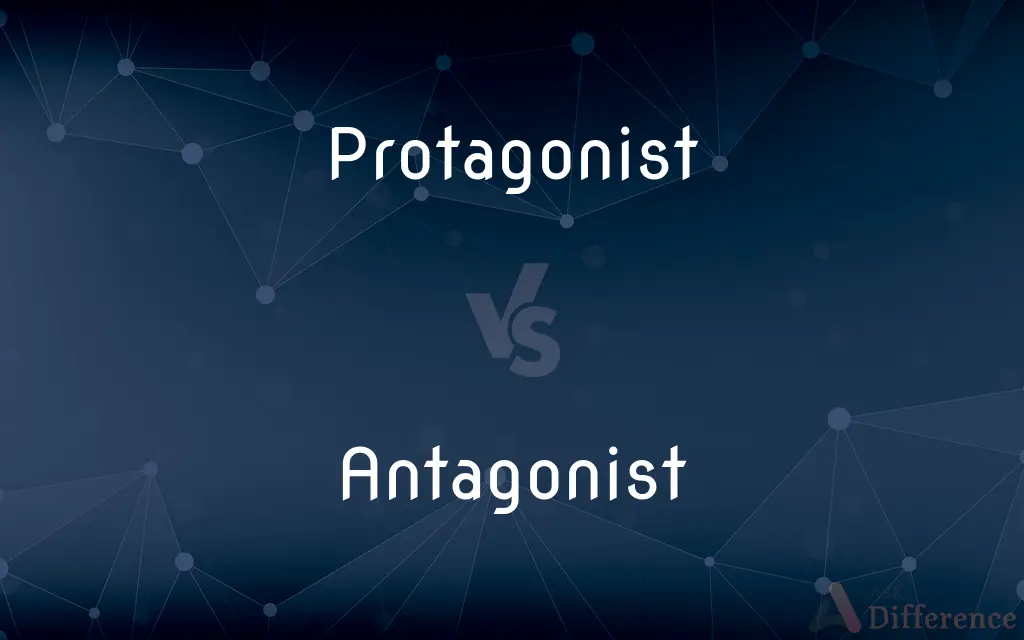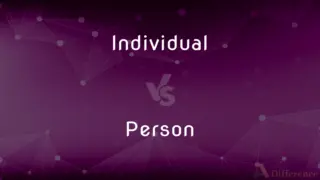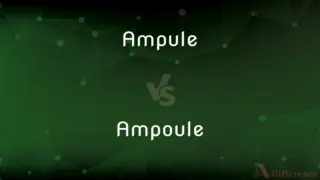Protagonist vs. Antagonist — What's the Difference?
Edited by Tayyaba Rehman — By Fiza Rafique — Updated on September 25, 2023
The "Protagonist" is the main character driving the story forward, while the "Antagonist" opposes or challenges the protagonist's goals.

Difference Between Protagonist and Antagonist
Table of Contents
ADVERTISEMENT
Key Differences
In literature and film, the Protagonist and Antagonist play essential roles that define the structure and conflict of the story. The Protagonist is typically the central character, around whom the narrative revolves. Their journey, growth, and objectives drive the plot forward. The Antagonist, in contrast, presents challenges or opposition to the protagonist, often acting as a foil and introducing conflict.
One can think of the Protagonist as the hero or main figure whom the audience is meant to root for or relate to. They often face trials, evolve, and aim for a specific goal. The Antagonist, meanwhile, can be an individual, a group, or even a concept that stands in the protagonist's path, preventing them from achieving their objectives. While they might be perceived as the "villain," this isn't always the case; they merely represent opposition.
It's essential to understand that both the Protagonist and Antagonist are crucial for a story's depth and dynamics. A compelling Protagonist allows the audience to engage emotionally, while a well-developed Antagonist can provide layers of complexity, making the story richer and more profound. Without the antagonist's challenges, the protagonist's journey might lack tension and interest.
However, not all stories fit the traditional Protagonist versus Antagonist mold. In some narratives, the protagonist might also be their own antagonist, facing internal conflicts. But in most conventional stories, the dynamic interplay between these two roles creates the central tension and drama.
Comparison Chart
Role in Story
Central character driving the plot
Introduces conflict or opposition
ADVERTISEMENT
Audience Perspective
Often relatable or rooted for
Often viewed as the obstacle or challenge
Development
Undergoes growth or change
Might remain constant or evolve in opposition
Nature
Can be good, flawed, or neutral
Can be evil, misunderstood, or neutral
Objective
Achieve a specific goal or resolution
Prevent protagonist from reaching their goal
Compare with Definitions
Protagonist
The main character in a story.
Harry Potter is the Protagonist in J.K. Rowling's series.
Antagonist
The force introducing conflict in a narrative.
The harsh environment is the Antagonist in Jack London's To Build a Fire.
Protagonist
The character whose journey the audience follows.
Frodo Baggins is the central Protagonist in The Lord of the Rings.
Antagonist
A character or group challenging the main character.
The White Witch is an Antagonist in The Chronicles of Narnia.
Protagonist
The leading role in a dramatic work.
Hamlet is the Protagonist of Shakespeare's play of the same name.
Antagonist
The character representing opposition in a story.
Sauron serves as the main Antagonist in The Lord of the Rings.
Protagonist
The individual undergoing growth or change.
Simba, as the Protagonist, matures throughout The Lion King.
Antagonist
An antagonist is a character in a story who is presented as the chief foe of the protagonist.
Protagonist
The central figure driving the narrative.
Elizabeth Bennet is the Protagonist in Pride and Prejudice.
Antagonist
A person who actively opposes or is hostile to someone or something; an adversary
He turned to confront his antagonist
Protagonist
A protagonist (from Ancient Greek πρωταγωνιστής, prōtagōnistḗs 'one who plays the first part, chief actor') is the main character of a story. The protagonist makes key decisions that affect the plot, primarily influencing the story and propelling it forward and is often the character who faces the most significant obstacles.
Antagonist
A substance which interferes with or inhibits the physiological action of another
LSD is a serotonin antagonist
Protagonist
The main character in a work of fiction, as a play, film, or novel.
Antagonist
A muscle whose action counteracts that of another specified muscle.
Protagonist
In ancient Greek drama, the first actor to engage in dialogue with the chorus, in later dramas playing the main character and some minor characters as well.
Antagonist
One who opposes and contends against another; an adversary.
Protagonist
A leading or principal figure.
Antagonist
The principal character in opposition to the protagonist or hero of a narrative or drama.
Protagonist
The leader of a cause; a champion.
Antagonist
(Physiology) A muscle that counteracts the action of another muscle, the agonist.
Protagonist
Usage Problem A proponent; an advocate.
Antagonist
A drug or chemical substance that interferes with the physiological action of another, especially by combining with and blocking its receptor.
Protagonist
(authorship) The main character, or one of the main characters, in any story, such as a literary work or drama.
Antagonist
An opponent or enemy.
Protagonist
A leading person in a contest; a principal performer.
Antagonist
One who antagonizes or stirs.
Protagonist
(proscribed) An advocate or champion of a cause or course of action.
Antagonist
(biochemistry) A chemical that binds to a receptor but does not produce a physiological response, blocking the action of agonist chemicals.
Protagonist
One who takes the leading part in a drama; hence, one who takes lead in some great scene, enterprise, conflict, or the like.
Shakespeare, the protagonist on the great of modern poetry.
Antagonist
(authorship) The main character or force opposing the protagonist in a literary work or drama.
Protagonist
A person who backs a politician or a team etc.;
All their supporters came out for the game
They are friends of the library
Antagonist
(anatomy) A muscle that acts in opposition to another.
A flexor, which bends a part, is the antagonist of an extensor, which extends it.
Protagonist
The principal character in a work of fiction
Antagonist
One who contends with another, especially in combat; an adversary; an opponent.
Antagonist of Heaven's Almigthy King.
Our antagonists in these controversies.
Antagonist
A muscle which acts in opposition to another; as a flexor, which bends a part, is the antagonist of an extensor, which extends it.
Antagonist
A medicine which opposes the action of another medicine or of a poison when absorbed into the blood or tissues.
Antagonist
Antagonistic; opposing; counteracting; as, antagonist schools of philosophy.
Antagonist
Someone who offers opposition
Antagonist
A muscle that relaxes while another contracts;
When bending the elbow the triceps are the antagonist
Antagonist
A drug that neutralizes or counteracts the effects of another drug
Antagonist
The character opposing the protagonist.
Voldemort acts as the primary Antagonist in the Harry Potter series.
Antagonist
The entity preventing the protagonist's objectives.
Iago is the Antagonist who schemes against Othello in Shakespeare's play.
Common Curiosities
Can a story have multiple Protagonists and Antagonists?
Yes, some stories feature multiple central characters and opposing forces.
Is it possible for a character to be both a Protagonist and an Antagonist?
Yes, in stories with internal conflicts, the main character might face their own demons.
Can an Antagonist have redeemable qualities?
Yes, many Antagonists are multi-dimensional with motivations the audience can understand.
Can a Protagonist be flawed or make mistakes?
Absolutely, many Protagonists are complex and face internal conflicts.
Do all stories need a clear Protagonist and Antagonist?
While common, not all narratives adhere to this structure; some explore themes or settings more broadly.
Are these terms only for literature?
No, Protagonist and Antagonist apply to film, theatre, and other narrative forms.
Can an inanimate object be an Antagonist?
Yes, anything that opposes the Protagonist, like nature, can be an Antagonist.
Does the Protagonist always win?
No, stories vary, and sometimes Protagonists face tragedy or fail in their goals.
Can an Antagonist become a Protagonist in a sequel?
Yes, character arcs can evolve, and previous opponents might become central figures later.
Is the Antagonist always a villain?
No, an Antagonist is an opposing force, but not necessarily evil.
How do I decide who the Protagonist is in an ensemble cast?
The Protagonist is often the character whose journey or growth is central to the narrative.
Is a story's conflict always between the Protagonist and Antagonist?
Often it is, but conflicts can also arise from external events or internal dilemmas.
Do readers always support the Protagonist?
Mostly, but complex stories might challenge whom the reader roots for.
Can the roles of Protagonist and Antagonist switch?
In dynamic narratives, roles can shift, and alliances might change.
Is the Antagonist's role only to cause conflict?
While conflict is central, Antagonists can also offer depth, themes, or mirror the Protagonist.
Share Your Discovery

Previous Comparison
Individual vs. Person
Next Comparison
Ampule vs. AmpouleAuthor Spotlight
Written by
Fiza RafiqueFiza Rafique is a skilled content writer at AskDifference.com, where she meticulously refines and enhances written pieces. Drawing from her vast editorial expertise, Fiza ensures clarity, accuracy, and precision in every article. Passionate about language, she continually seeks to elevate the quality of content for readers worldwide.
Edited by
Tayyaba RehmanTayyaba Rehman is a distinguished writer, currently serving as a primary contributor to askdifference.com. As a researcher in semantics and etymology, Tayyaba's passion for the complexity of languages and their distinctions has found a perfect home on the platform. Tayyaba delves into the intricacies of language, distinguishing between commonly confused words and phrases, thereby providing clarity for readers worldwide.














































